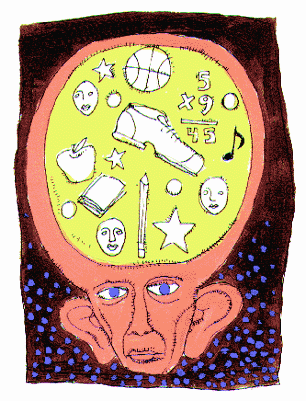Memory & Identity In Relentlessly Fast Forward & Memetically Crowded Times (MONDO 2000 History Project Entry #11)
""){ ?> By R.U. Sirius
For me, the Mondo 2000 History Project is this weird process of exploring my own history — among others — in the context of that magazine and scene. In an introduction for the book (expect it to be completed around the end of the year), someone who shall remain nameless for now quotes from my original proposal for a book that would have been similar to this one but even more complicated and extensive. It stands alone as a sort of reflection on memory and identity in relentlessly fast forward and memetically crowded times… and, of course, it peters out at the end with a note to self, which makes a sort of sense in context.
Here then…
From Introduction to Use Your Hallucinations: The MONDO 2000 History ProjectÂ
Consider first of all the disconnect that all of us feel from ourselves in the past. A few decades back, neurology imagined memory as a sort of computer file from which we could search and call up precise replicas of our experiences if only we had sufficient abilities to remember. These days, it’s understood that memories are fluid, composed of the detritus of actual observed occurrences; impressions that may have been inaccurate in the first place and may have mutated over time; temporally scrambled memories (events that are conflated); and, for many, false memories (more frequent with women than men). At the extreme of memories’ malleability, there are even people who intentionally or unintentionally implant memories in others with measurable success — an alien abductions (and, yes, perhaps an autopsy) is recollected under “hypnosis” or guided visualizations, etc.
And in fact, neurological evidence now suggests that childhood trauma may have less to do with who we are than last month’s ill treatment at the hands of a bank, law enforcement or abusive relative. In fact, given the recent evidence, it has been conjectured by longevity nuts that humans who live 400-600 years will likely not remember there childhoods at all.
If memory, by nature, is so vague that one needs to act as one’s own detective to gather up the bits of one’s biographical life, the situation is rendered even more dire when living in mediated, populated times. To wit: we might see more people in an afternoon on a city street than were alive on planet earth at the start of agriculture. If you’d lived through the Civil War in 1861-‘65, your memories would probably have been more intense than those of a boomer hipster who avoided Vietnam to hang out in the counterculture, but they would likely be far fewer. Your human interactions would probably have taken place in your hometown involving a few thousand people, and out on the battlefield with a few thousand more. If you were literate, you may have filled your mind up with ideas and characters from books – still, this leaves you with the possibility of an uncluttered and leisurely stroll down memory lane compared to what we contemporaries have experienced.
The modern – or if you prefer postmodern memory – is, by comparison, an assault victim, if not an amputee. We have been filled up by a thousandfold more interactions and a millionfold more observations of fabricated, mediated realities — the memories of thousands of television shows and films, probably hundreds of thousands of songs, and the nearly infinite variations of content and interaction that have passed before our seemingly conscious minds online. Our memories are filled largely with the trivial — discards that don’t get discarded, but fade and are swallowed into the mashup that constructs our alleged selves. And none of this matters much. There is no absolute necessity for most of us to make a connection to a personal biographical narrative.  There is, in fact, as postmodernists and neurologists have told us, no central self, no little homunculus sitting at the seat of the nervous system or soul making the movie of our selves 24/7.
The sense of self, in fact, seems to be an epiphenomenon that arises out of distributed, disconnected thoughts and experiences that are only nominally and occasionally integrated and variously recombined dependent on the circumstance and the kind of effort it does or does not require. A different self then occurs every moment, albeit it’s a self with habits and attitudes very much like the one from the moment previous.
So it may be the better part of wisdom not to locate one’s life story, but rather – like the ancient Chinese Taoists, to go with the flow… in this time, the flow being entirely forwards, a flow of acceptance of speed and distraction, of involvements – frequently mediated — with the present and future, with past memories only valued in accordance with the statute of limitations and if under indictment.
Humor me though if I take my personal case a bit further still. While I identify all of us with these conditions of memory, I launch this investigation into my biographical narrative with at least the illusion that my sense of being in the world – and perhaps therefore my sense of the distance between self and memory — may be more pronounced than most, and that my process of rummaging around amidst the evidence of a life lived weirdly might illuminate something about human consciousness. (note to self: mild autism?, family vagueness, lack of continuity with friends, drugs).
Previous MONDO History Entries

